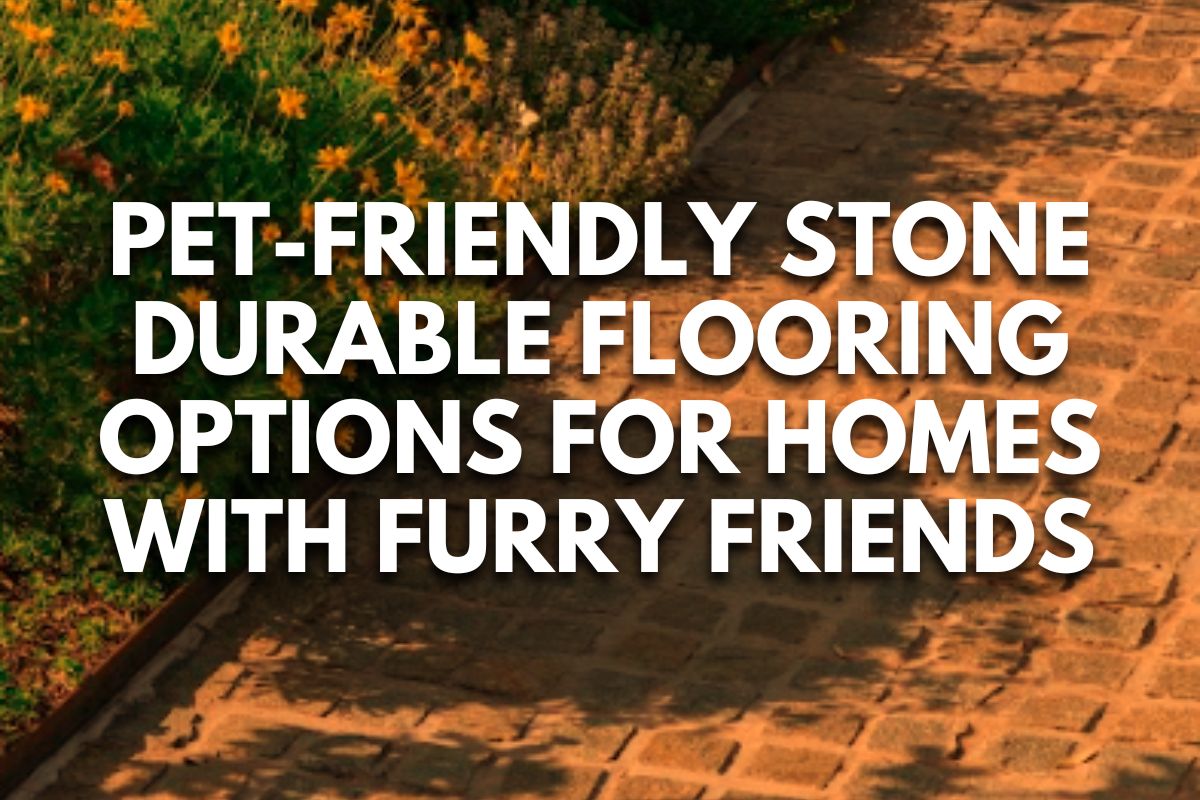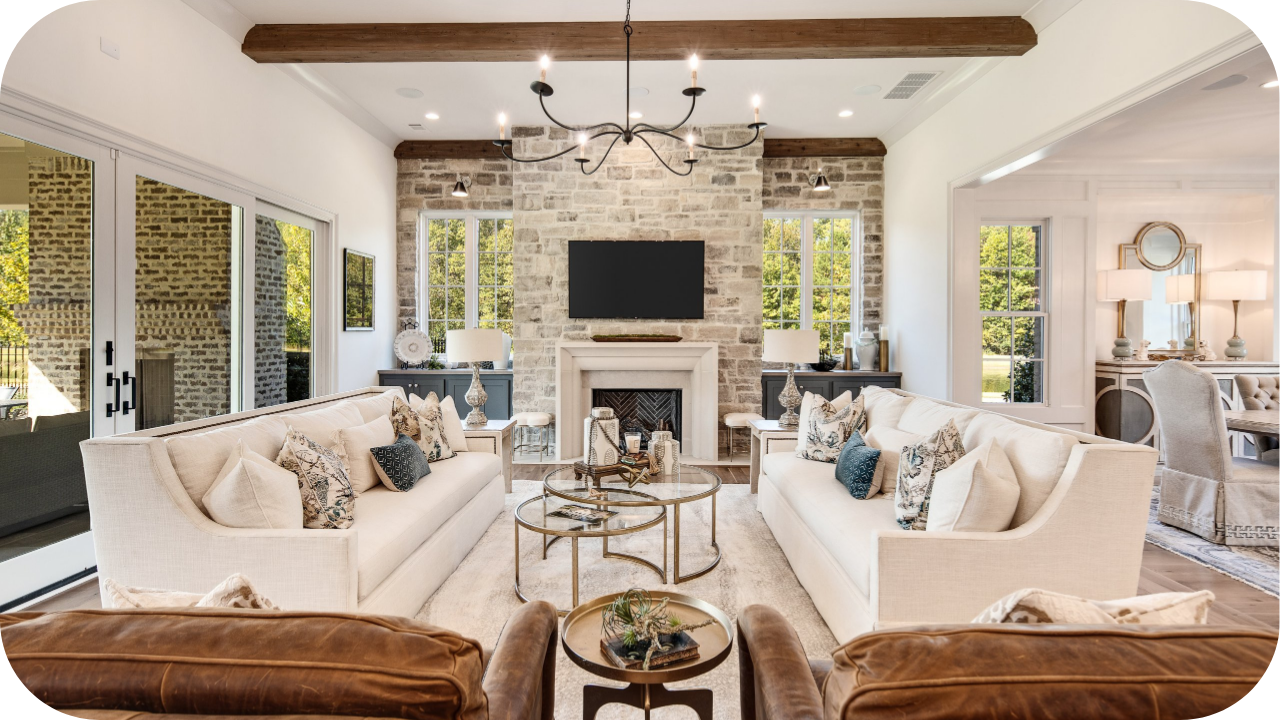
Scratched hardwood, stained carpets, muddy paw prints – owning pets can wreak havoc on your floors.
You love your furry companions, but constantly worrying about damaged flooring is stressful. You need a solution that combines style with resilience.
Natural stone flooring offers the perfect blend of beauty and pet-proof practicality. Discover the types of stone that will transform your home into a stylish and worry-free haven for you and your pets.
Importance of Pet-Friendly Flooring
Selecting the right flooring material is crucial for pet owners. Pets can cause significant wear and tear on floors through:
- Scratches from claws
- Stains from accidents
- Tracked-in dirt and debris
Flooring that isn’t pet-friendly can quickly become damaged and unsightly, leading to costly repairs or replacements.
Factors to Consider When Choosing Pet-Friendly Flooring
Here’s a table summarizing the important factors to consider when choosing pet-friendly flooring:
| Factor | Description |
| Durability | Look for materials that are scratch-resistant and can withstand heavy traffic. |
| Stain resistance | Opt for flooring that is easy to clean and won’t absorb spills or accidents. |
| Traction | Choose a floor with good traction to prevent slips and falls for you and your pet. |
| Maintenance | Consider how easy the flooring is to clean and maintain. |
| Style | Don’t compromise on aesthetics! Choose a flooring option that complements your home’s décor. |
Characteristics of Pet-Friendly Stone Flooring
Stone flooring offers several key characteristics that make it ideal for homes with pets:
- Durability: Stone is incredibly strong and can withstand heavy foot traffic (human and animal!). It won’t easily dent, chip, or crack under the demands of playful pets.
- Scratch Resistance: Stone’s hardness makes it highly resistant to scratches from pet claws, ensuring your floors look beautiful for years to come.
- Stain Resistance: Many stone types are naturally non-porous, which minimises the absorption of spills and accidents. This makes it easier to clean up messes and prevent lasting stains.
- Easy Maintenance: Stone floors require minimal upkeep. Regular sweeping or vacuuming with occasional mopping is usually enough to keep them looking their best.
Stone materials owe their pet-friendly attributes to their formation; created by intense heat and pressure over time, they possess inherent toughness and an impervious nature.
Types of Pet-Friendly Stone Flooring
Here’s a breakdown of some of the best stone flooring options for homes with pets:
- Granite: Extremely hard and scratch-resistant, and it comes in a wide range of colors and patterns. Well-suited for high-traffic areas like kitchens and entryways.
- Slate: Offers a beautiful, textured surface that is naturally slip-resistant. Its earthy tones create a warm and inviting feel.
- Quartzite: Very similar in strength to granite and boasts stunning veining for a luxurious look. It is a great option for those who enjoy the marble aesthetic but want a more durable stone.
- Porcelain Tile: While not a natural stone, porcelain is manufactured to be exceptionally strong and stain-resistant. It often mimics the look of natural stone and offers a diverse range of styles and designs
Important Note: Proper sealing is vital to maximise stain resistance and enhance longevity even with durable stone. It’s also recommended that pets’ nails be trimmed regularly to minimize the risk of scratching.
Benefits of Stone Flooring for Pet Owners
Stone flooring provides a host of advantages for homes with furry companions:
- Unmatched Durability: Stone stands up to the daily challenges of pet ownership, resisting scratches, stains, and the impact of boisterous play. This translates to less worry about damaged floors and reduced long-term replacement costs.
- Scratch Resistance: Pets’ claws pose no threat to the hard surface of stone floors, ensuring your investment maintains its beautiful appearance for years.
- Easy Cleaning: Spills, muddy paw prints, and pet accidents clean up effortlessly from the non-porous surface of most stone floors, leaving your home hygienic and fresh-smelling.
- Health and Hygiene: Unlike carpet, stone doesn’t trap allergens, pet hair, or dander. This creates a healthier environment for those with sensitivities and reduces the potential for lingering odours.
Stone flooring truly offers a blend of resilience, practicality, and a healthy living space – a winning combination for pet owners!
Considerations for Pet-Friendly Stone Flooring
While stone is generally a great choice, there are specific things to keep in mind to ensure the best fit for you and your furry friends:
- Hardness: Aim for the hardest stones possible. Granite and quartzite are excellent options. Consult with a flooring professional about the relative hardness of different stone types.
- Texture: Some stones naturally have a textured surface (like slate), which provides added traction for pets. If you opt for smooth stone, rugs in high-traffic areas can prevent slipping.
- Slip Resistance: Factor in your pet’s age and agility. Senior pets or those with joint issues would benefit most from floors that offer excellent traction.
- Pet Size and Activity: Large, energetic dogs will put more wear on floors. Choose a tough stone with a texture that suits your pet’s activity level.
- Lifestyle: Consider the areas where your pet spends the most time and prioritise pet-friendly flooring options in those spaces.
By carefully evaluating these factors, you’ll select the perfect stone floor that combines beauty, longevity, and a safe, comfortable environment for your pets.
Maintenance Tips for Pet-Friendly Stone Flooring
Even the most durable stone floors benefit from some care to maintain their beauty. Here’s how to keep yours looking great:
- Preventive Measures:
- Place mats and rugs at entryways to catch dirt and debris.
- Trim your pet’s nails regularly to minimise scratches.
- Invest in a comfortable pet bed to encourage them to nap off the floor.
- Regular Cleaning:
- Sweep or vacuum daily to remove pet hair and loose dirt.
- Mop weekly using a stone-safe, pH-neutral cleaner. Avoid harsh chemicals.
- Blot up spills immediately to prevent staining.
- Important Notes:
- Sealing your stone floors will enhance stain resistance and ease cleaning.
- Consult with your stone supplier or a flooring specialist regarding the best cleaning and sealing products for your specific stone type.
Design Considerations and Aesthetics
Don’t think that having pets means sacrificing style! Stone flooring offers a wealth of design possibilities for pet-friendly homes:
- Colour and Pattern: Embrace the natural beauty of stone. Choose colours that complement your décor and help disguise minor dirt or pet hair. Earthy tones and subtle patterns are both stylish and forgiving.
- Texture: Textured stones like slate add visual interest and provide traction for pets. Contrast textures using a smooth polished stone paired with textured rugs for a layered look.
- Grout Selection: Consider darker grout for high-traffic areas, as it’s more effective at hiding potential stains or dirt.
- Rugs and Runners: Layer rugs strategically for added warmth and a designated cosy spot for your pets. Choose durable, washable materials for easy maintenance.
- Overall Style: Stone flooring blends seamlessly with various design styles – from rustic farmhouse to sleek and modern.
Case Studies and Examples
Let’s look at how real-life pet owners have successfully incorporated stone flooring:
- Example 1: Rustic Retreat with Slate A warm and inviting home with textured slate flooring in the kitchen and mudroom. Slate is durable and perfect for muddy paws. Darker grout effectively camouflages any dirt.
- Example 2: Modern Farmhouse with Granite Sleek granite countertops and floors create a cohesive and stylish look. Strategic area rugs offer softness and pet-friendly zones, while the granite remains scratch-free.
- Example 3: Pet-Proof Entryway with Quartzite An entryway featuring stunning quartzite flooring – the marble-like appearance adds elegance, and the stone’s incredible hardness withstands the daily in-and-out of multiple dogs.
These examples highlight how stone’s durability harmonises with thoughtful design. Choices like textured surfaces for traction, strategic rug placement for comfort, and stain-camouflaging grout contribute to successful pet-friendly spaces.
Remember, your home’s style and your pets’ needs will guide your best choices. These case studies offer inspiration for creating a home you and your furry friends will love.
Cost Considerations
Stone flooring is generally a higher-priced option than alternatives like laminate or vinyl. However, it’s essential to consider it as a long-term investment:
- Initial Costs: Material costs vary depending on the stone type, with granite and quartzite typically being more expensive than options like slate. Professional installation will also add to the expense.
- Long-Term Savings: Stone’s exceptional durability means you likely won’t need to replace it as often as other flooring types damaged by pets. Additionally, it requires minimal maintenance, translating to lower costs over time.
- Budget-Friendly Strategies:
- Consider using stone in high-traffic areas most frequented by pets.
- Opt for smaller tiles, which can be more affordable than large format slabs.
- If you’re DIY-savvy, tackling the installation yourself can significantly reduce costs.
- Value: Stone flooring can increase the resale value of your home.
Ultimately, stone’s true value lies in its ability to provide years (or even decades) of worry-free enjoyment in a home shared with pets. When weighed against the cost of repeatedly replacing less durable flooring, stone often emerges as the more cost-effective choice in the long run.
Conclusion
Stone flooring offers the perfect blend of durability, style, and easy cleaning – a winning choice for pet-loving households.
Explore the world of natural stone to find the ideal option for your home, creating a space where you and your furry companions can thrive in comfort and style.
More To Explore

Stone Accents: Adding Charm to Modern Interiors with Natural Stone
Modern interiors seek a balance of style, durability, and uniqueness. Natural stone accents are a game-changer, adding timeless elegance and character to any space. As

Natural Stone Features That Will Transform Your Living Room
Natural stone elevates any living room with elegance, texture, and timeless appeal. Its versatility allows it to enhance both modern and traditional spaces. From stone


